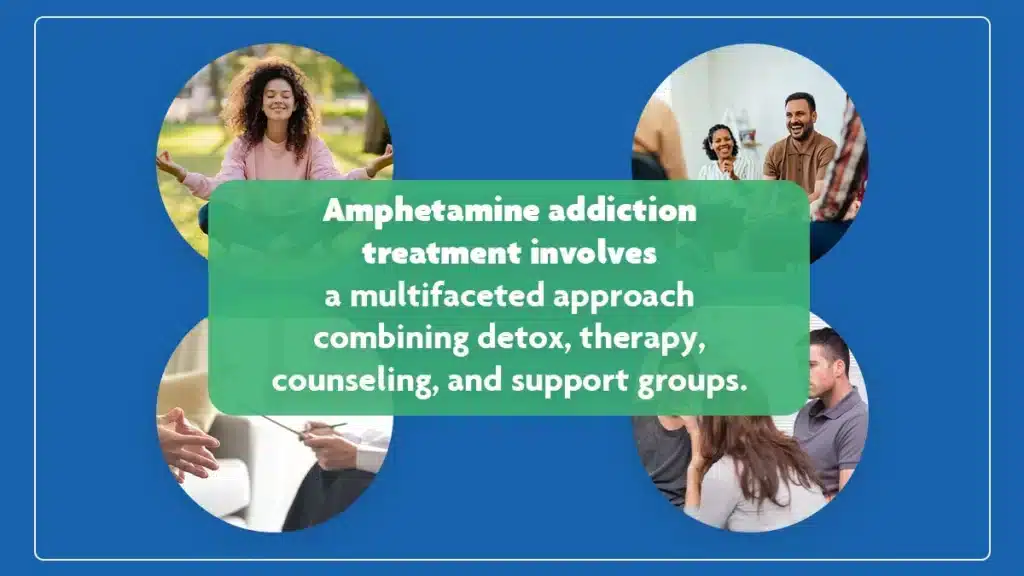Amphetamine Addiction: Your Guide to Treatment
Amphetamine addiction involves the compulsive use of stimulant drugs like Adderall or methamphetamine, leading to physical and psychological dependence.
Individuals struggling with addiction to amphetamine may experience increased energy, focus, and euphoria initially but face detrimental consequences like insomnia, weight loss, and mental health issues over time.
Fortunately, there are diverse treatment options available to assist those battling amphetamine addiction. This article will explore these comprehensive solutions, helping those affected to overcome addiction and regain control of their lives.
Key Takeaways

Amphetamines, whether prescription or illicit, can cause addiction when misused. Here is what you need to know:
Amphetamines cause a surge of pleasure-inducing chemicals in the brain, leading to addiction over time.
Treating amphetamine addiction is essential due to its severe impacts on overall health and personal life.
Various effective treatment options are available for amphetamine addiction, such as inpatient rehab programs.
Get specialized help for teens struggling with substance abuse disorder through our teen treatment center; call us today at (845) 479-6888.
What Are Amphetamines?
Amphetamines are a group of stimulant drugs that affect the central nervous system (CNS). They increase the levels of certain chemicals in the brain, such as dopamine and norepinephrine, which affect mood, alertness, and energy levels.
Legal Use: Legally, amphetamines can be prescribed by doctors to treat medical conditions like attention deficit hyperactivity disorder (ADHD) and narcolepsy. Commonly prescribed legal amphetamines include Adderall, Dexedrine, and Vyvanse.
Illegal Use: Amphetamines might be sold and used for non-medical purposes illegally. This could involve substances like methamphetamine (meth), which is a highly addictive and potent illegal drug. Meth has a high potential for abuse and can cause severe health issues and addiction.
Abuse of both legal and illegal amphetamines can result in various short-term and long-term health problems, including addiction, cardiovascular issues, insomnia, anxiety, and, in severe cases, psychosis or death.
Therefore, it’s crucial to use amphetamines only as prescribed by a doctor and to be aware of their potential for abuse and the associated health risks when used recreationally or without a prescription.
How Amphetamines Lead to Addiction: A Closer Look
Amphetamines are stimulants that affect the central nervous system (CNS) by increasing dopamine and norepinephrine levels in the brain. Dopamine is a neurotransmitter associated with pleasure and reward, while norepinephrine affects alertness and arousal.
When someone uses amphetamines, they experience a surge in dopamine, creating intense feelings of euphoria, increased energy, and heightened focus. This rush of positive sensations can lead to repeated use as the brain seeks to replicate those pleasurable feelings.
Over time, the brain adapts to the presence of amphetamines, becoming tolerant to their effects. As a result, individuals may need higher doses to achieve the same high they initially experienced. This cycle of tolerance and increased dosage contributes to the development of dependence.
In addition, continued use of amphetamines can alter the brain’s reward system, making it less responsive to natural rewards like food or social interactions. This can lead to a situation where the person feels the need for the drug to feel pleasure or even just to function normally, fostering psychological dependence.
Moreover, abruptly stopping amphetamine use after prolonged use can result in withdrawal symptoms like fatigue, depression, increased appetite, and sleep disturbances. These symptoms of withdrawal can be highly uncomfortable, further reinforcing the cycle of addiction as individuals may continue using amphetamines to avoid these negative feelings.
Overall, the combination of the drug’s effects on brain chemistry, tolerance development, and withdrawal symptoms contributes to the addictive nature of amphetamines.
Why Treating Addiction Matters: Exploring the Impacts
Amphetamine addiction takes a heavy toll on individuals, affecting their physical health, mental well-being, and personal lives. Addressing and treating this addiction is essential due to the profound impacts it has across various aspects of a person’s existence.
Amphetamine addiction can wreak havoc on the body. Continuous use can lead to severe weight loss, malnutrition, and disrupted sleep patterns. Heart problems, such as irregular heartbeat and high blood pressure, are common among long-term users.
Moreover, the risk of stroke or seizures significantly increases. Dental issues, like tooth decay and gum disease, are prevalent due to dry mouth and poor oral hygiene associated with amphetamine use. Seeking treatment is vital to prevent these physical health complications and restore the body’s well-being.
Mental health takes a dive with amphetamine addiction. Persistent use can lead to anxiety, paranoia, and hallucinations. Depression often accompanies amphetamine withdrawal, making it challenging to quit without professional help.
Cognitive functions such as memory, attention, and decision-making can impair daily life and productivity. Treatment aims to restore mental clarity, stabilize mood, and alleviate the psychological distress caused by addiction.
Amphetamine abuse strains personal relationships and responsibilities. It can lead to social isolation as individuals prioritize drug use over spending time with family members and friends. Employment and academic performance suffer due to decreased productivity and focus.
Financial difficulties arise as money is diverted to sustain the addiction. Medical treatment helps individuals regain control over their lives, assists in rebuilding broken relationships, and re-establishes a sense of purpose and stability.
When to Seek Help: Signs of Amphetamine Addiction
Knowing when to seek help for amphetamine addiction is crucial for beginning the journey toward recovery. Several signs and situations can indicate the need for professional assistance in addressing this challenging addiction.
When tolerance to amphetamines builds up, individuals may find themselves requiring higher doses to achieve the desired effects. This escalating pattern of use often indicates a problematic dependency. If you notice yourself or someone you care about needing more of the drug to feel its effects, it’s time to consider seeking help.
Chronic amphetamine use can disrupt various aspects of life. If drug use starts interfering with work, school, relationships, or daily responsibilities, it’s a sign that professional intervention may be necessary. Missing deadlines, neglecting personal hygiene, or facing conflicts due to drug use are indicators that it’s time to seek help.
Experiencing withdrawal symptoms when attempting to stop using amphetamines signifies physical dependence. Symptoms like fatigue, irritability, anxiety, and intense cravings can make it challenging to quit without assistance. Seeking help from professionals can provide the necessary support to manage these symptoms safely.
Repeated failed attempts to quit or cut down on amphetamine use indicate the need for specialized help. Addiction is a complex condition that often requires professional guidance and support to overcome. If quitting on your own has been challenging despite genuine efforts, reaching out for professional assistance is advisable.
A decline in physical health, such as significant weight loss, sleep disturbances, or dental issues, might be linked to amphetamine addiction. Additionally, deteriorating mental health, like increased anxiety, depression, or paranoia, can indicate the need for treatment to address the underlying addiction.
Recognizing these signs and acknowledging the impact of amphetamine addiction on one’s life marks a crucial step toward seeking help and embarking on the path to recovery.
Overcoming Amphetamine Addiction: Effective Treatments
Recovery from amphetamine addiction involves a spectrum of treatment options aimed at addressing both the physical and psychological aspects of dependency. Let’s explore different treatment options aimed at helping individuals overcome amphetamine use disorder.
Medical detox is often the first step in amphetamine addiction treatment. This supervised process involves gradually reducing drug intake while managing withdrawal symptoms. Medical professionals monitor individuals to ensure safety and provide medications to alleviate discomfort. The detox process helps the body rid itself of the drug, preparing the individual for further treatment.
Inpatient rehab programs offer a structured, immersive environment where individuals reside at a treatment facility. These programs provide intensive therapy, counseling, and support. Being in a controlled environment minimizes exposure to triggers and facilitates focused recovery. Inpatient treatment is beneficial for those requiring a higher level of care or individuals with severe addiction.
Outpatient rehab programs allow individuals to receive treatment while living at home. This flexibility enables participants to maintain daily responsibilities. Outpatient programs typically include counseling, therapy sessions, and support group participation. This option is suitable for those with a stable living environment and a manageable addiction.
Behavioral therapies are fundamental in addressing the psychological aspects of addiction. Common approaches include cognitive behavioral therapy (CBT), contingency management (CM), and motivational enhancement therapy (MET). These behavioral interventions help individuals identify and change destructive thinking and behavior patterns, fostering long-term recovery.
Medication-assisted treatment (MAT) combines prescription medications with counseling and behavioral therapies to treat substance use disorders (SUDs) effectively. For amphetamine addiction, there aren’t specific FDA-approved medications, but some medicines, like bupropion, may help manage withdrawal symptoms and cravings. MAT can be an effective tool, especially when integrated into a comprehensive treatment plan.
Many individuals with amphetamine addiction also have co-occurring mental health conditions. Dual-diagnosis treatment addresses both addiction and underlying mental illness simultaneously. This integrated approach increases the likelihood of sustained recovery by treating the whole person.
Support groups, such as Narcotics Anonymous (NA) or SMART Recovery, provide a sense of community and understanding. Sharing experiences and coping strategies with peers facing similar challenges can be empowering. Support groups are valuable for ongoing recovery maintenance.
Lifestyle changes encompass adopting healthier habits, such as regular exercise, balanced nutrition, and adequate sleep, which can aid in recovery. In addition, holistic therapies like yoga, meditation, and acupuncture complement traditional treatments, promoting overall well-being.
Remember, recovery is a personal journey, and the effectiveness of treatment varies from person to person. Seeking medical advice and support ensures a comprehensive and individualized approach, fostering the best chance for sustained recovery.
Frequently Asked Questions (FAQ)
What medication is used for amphetamine toxicity?
In cases of amphetamine toxicity, doctors may prescribe medications like benzodiazepines to help manage symptoms such as agitation, seizures, and high blood pressure. These medications help calm the individual and control symptoms associated with amphetamine overdose.
What does amphetamine do to the brain?
Amphetamines increase neurotransmitter levels, especially dopamine, in the brain. This surge creates a sense of euphoria, heightened alertness, and increased energy. Prolonged use can lead to altered brain function and potential addiction.
Is amphetamine an antidepressant?
Amphetamines are not classified as typical antidepressants. However, some medications that contain amphetamine-like compounds, such as Adderall, may be prescribed off-label to address symptoms of major depression in some instances.
What is amphetamine addiction, and how do I identify the signs of it?
Amphetamine addiction is a reliance on drugs like Adderall or crystal meth, leading to compulsive use despite negative consequences. Signs include increased tolerance, withdrawal symptoms, neglecting responsibilities, mood swings, and changes in behavior or appearance.
Guiding Teens on the Path to Wellness
Our specialized teen treatment center is committed to guiding your teen toward a brighter, healthier future.
Our caring staff provides unwavering support throughout your teen’s recovery journey. Enroll them in our residential treatment program, where they’ll experience a tailored approach with individual counseling, group therapy, family sessions, educational workshops, and engaging activities like art and music therapy.
Call us now at (845) 479-6888 for more information about our programming.


